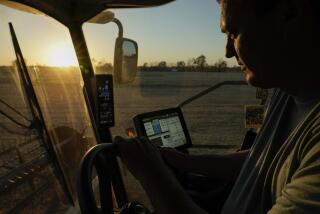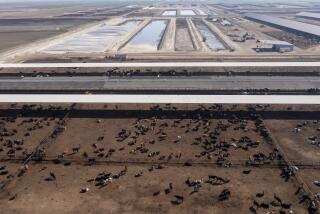Domino Effect as Family Farms Fail : Small Town Mid-America on 1980s’ Endangered List
- Share via
VERDIGRE, Neb. — Main Street windows display the signs of trouble in rural America.
Notices taped on plate-glass storefronts announce the sales of farms and farm equipment: Two this week, one next week, three the week after.
Karen’s Cafe is “Closed Until May” the sign says, but people in Verdigre doubt it will ever reopen.
The building that housed the only Chevrolet dealer for miles around is empty. The windows reveal a showroom floor littered with paper and one dead sparrow.
A sign in the window of Heaton’s Food Center says: “Verdigre Is . . . Farmers and Businesses Working Together.” But these days, Verdigre and farmers are withering together.
The town’s bank failed last year. One of the two gas stations is closed. So is the self-service laundry. One farm supply store is threatened with foreclosure. Another farm supplier expects to file for bankruptcy later this week.
“I think this town is going to dry up,” said Roger Jacobson, manager of the Farmers Cooperative Assn. here and president of the merchants’ Improvement Club.
“It’s a trying time,” said Mayor and Fire Chief Virgil Miller.
And Verdigre in northeast Nebraska, population 650, is not alone.
Throughout the Midwest’s Grain Belt, thousands of small towns--once the mainstay of traditional American values, grist for writers like Sinclair Lewis and Sherwood Anderson, way stations for millions who migrated from farms to urban centers--are endangered.
Small town mid-America and its Main Street businesses are being eroded by the same waves of change that are washing family farmers from the land. High interest rates, low commodity prices, a decline in foreign trade, declining land values and ineffective government programs are causing family farms to collapse at rates unseen since the Great Depression.
“If we have a 30% decline in farm population over the rest of the 1980s, as many suggest, it will mean economic and social demise for many communities,” said Larry D. Swanson, former director of the University of Nebraska’s Great Plains Policy Studies office.
One in Five Face Move
Agricultural economists say that here in Nebraska, one of every five farmers could be forced off the land this year.
“Some small towns are not going to be viable when this is all over with,” said Mark R. Drabenstott, senior economist for the Federal Reserve Bank of Kansas City.
“There is now a real panic among small-town people who can see the end is in sight if something does not change in the farm economy,” said Marty Strange, co-director of the Nebraska-based Center for Rural Affairs.
The threat is primarily to small towns like Verdigre or like Woodbine, Iowa, where the bank has also failed. In the Midwest, the family farm is a mainstay of the rural economy and there is the greatest concentration of counties that are dependent on agriculture.
Nationwide, only 700 rural counties have economies that are agriculturally dependent, but more than a third of them are located on the heartland prairies and high plains. Government studies show that rural areas in the West and Southwest are generally stable or growing.
The change for towns will come slowly. It will take a while before whole towns actually disappear. But the ripple effect of the vanishing family farmer can already be seen.
Severe Financial Problems
A recent survey by the Federal Reserve Bank of Kansas City found that one of every five rural non-farm businesses is experiencing “severe” financial problems, nearly double the rate reported a year ago. In the last six months, 2.9% of the financially stressed rural businesses have failed. That is twice the normal rate.
“Business is down 30%,” said Larry Frank, manager of Heaton’s Food Center in Verdigre. “A lot of people are just trying to hang on.”
The collapse of rural business, coupled with the collapse of family farms, has long-term implications for local, county and state heartland governments.
The “tax base is declining, and that means it’s much more difficult to maintain basic infrastructure and public services like water and roads,” said Steve C. Williams, a research analyst with the Nebraska Department of Economic Development.
Verdigre, which won an “All America City” award in 1971 because of the amenities it provided its population, no longer can afford to repair potholes. It has stopped street paving and curb installation programs.
Outlook of People Suffers
“One of the most devastating things we’re finding is the outlook of people in these small communities,” said J. M. Whitmer, an Iowa State University political scientist who works with rural local governments.
“People feel there is no future there. It ripples into churches, bond issue votes. People put important things off for a year like school construction, road work, bridge repair.”
The collapse of family farms is hurting churches too. University of Nebraska agricultural economist Paul Gessaman conducted a seminar for rural pastors recently and “learned that there was not a single small-town church that wasn’t in economic trouble.”
“They were talking about merging, about how they couldn’t see how they’d pay their ministers in the next few years,” Gessaman said. “These churches, and social institutions like garden clubs and women’s clubs are doomed to disappear.”
Other institutions will feel the impact as well.
School Districts Suffer
Local school districts will be unable to maintain their autonomy because of declining enrollment, leading to reduced state aid. Verdigre’s schools have only 259 students, 21 fewer than three years ago. Next year the number could be down by as many as 100, according to Robert Jacobs, the school superintendent, who believes that Verdigre schools will eventually have to consolidate with a neighboring district.
“We have a lot of classes like home economics with only two kids enrolled. How in the world is that cost-effective?” Jacobs asked. He has another more pressing concern. “What are these kids going to do when they get out of school? They used to go home and farm. The family farm can’t support them now. Where are we going to put them to work.?”
“Kids growing up in these small communities don’t see their future there,” said researcher Williams. “Towns under 5,000 are rapidly losing their younger people and the balance of their population is increasingly elderly.”
“You can’t field a baseball team with only six kids,” said Iowa State political scientist Whitmer. “If you want certain services for the community you need certain numbers. If people leaving the community are working-age, you’re going to have a problem getting together a volunteer fire service. You can’t run a volunteer fire service with retired people. That is what you need the young bucks for.”
Little to Attract Industry
Without a young labor pool there is also little to attract new industry, which, in turn, would stimulate Main Street business.
“Keep Verdigre Alive for Us,” pleads a sign in the town’s bakery window. It was drawn by fourth graders.
The ripples will reach county government in a few years when tax revenues begin to decline as a result of Main Street business losses. This will translate into reduced law enforcement and less road maintenance, or into higher taxes for those who remain. Already schools, counties and states are beginning to feel the economic squeeze of reduced income because land values have dropped and are generating lower property taxes.
“There is a potential for a collapse of the total economy in some areas of Nebraska,” said Larry L. Bitney, a University of Nebraska farm management specialist. “So many people are going out of business that there are no buyers for land or machinery. Main Street businesses, the feed dealer, the grocer, are feeling it. Some of the towns can’t survive.
May Become Ghost Towns
“I don’t know that they’ll become ghost towns but they’ll be nothing like they were.”
“As more and more people in the community have trouble on their farms, it rubs off on the next business,” said Thomas H. Huston, banking superintendent in neighboring Iowa. “As the farmer goes broke he doesn’t buy farm equipment, he doesn’t join the golf club, he doesn’t eat dinner out. Farmers who go broke don’t give to the church. Eventually the whole economy collapses in these little towns.”
“Sorry we had to close. Thank you so much for your support. Charlie & Glenda,” reads a note taped to a store window in Woodbine, across the border in Iowa, one more town where Main Street windows display the signs of trouble in rural America.
Researcher Wendy Leopold assisted with this article.
More to Read
Sign up for Essential California
The most important California stories and recommendations in your inbox every morning.
You may occasionally receive promotional content from the Los Angeles Times.













